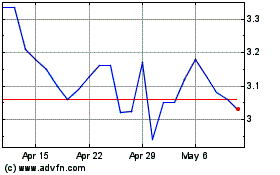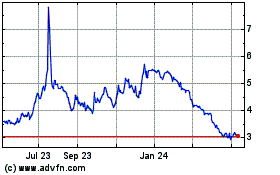By Anne Steele, Brent Kendall and Cara Lombardo
This article is being republished as part of our daily
reproduction of WSJ.com articles that also appeared in the U.S.
print edition of The Wall Street Journal (December 13, 2019).
An affiliate of John Malone's Liberty Media Corp. is seeking
Justice Department permission to buy a larger piece of iHeartMedia
Inc., according to people familiar with the matter, a deal that
would put the nation's largest radio broadcaster under the same
corporate umbrella as the leading concert promoter and
satellite-radio giant SiriusXM.
Liberty owns a 4.8% stake in iHeart through Liberty SiriusXM
Group; the deal now under consideration could give it control or
outright ownership of the broadcaster, according to people familiar
with the matter.
The government is considering the request, the people said, with
one of them cautioning that Liberty hasn't decided what kind of
transaction, if any, it would proceed with should it receive
permission.
Liberty acquired its iHeart stake via debt it took on before the
company restructured, which converted to equity when the
broadcaster emerged from bankruptcy early this year.
Liberty owns 33% of Live Nation Entertainment Inc., making it
the concert giant's largest shareholder, and 71% of satellite-radio
company Sirius XM Holdings Inc.
A deal for iHeart would increase its ability to collaborate
among those businesses, potentially creating a bulwark against the
rising influence of music-streaming companies.
Last year, Liberty orchestrated Sirius's purchase of
internet-radio company Pandora Media Inc. -- in which it also held
a controlling stake -- for $3 billion, another move intended to
compete more effectively against Spotify Technology SA and other
on-demand music-streaming services.
Liberty Chief Executive Greg Maffei at an investor day in late
November touted the company's increased focus on audio and
particularly its exposure to the "exploding" podcast market
including through iHeart, the No. 2 publisher by audience,
according to Podtrac, a podcast-analytics company.
If Liberty were to gain control of iHeart, it would represent a
major consolidation of the avenues by which music and other audio
content is distributed, promoted and monetized.
Justice Department antitrust officials recently asked interested
parties how they might be affected by a potential deal between a
live-entertainment company and a radio company, according to a
person familiar with the inquiries, without mentioning Liberty,
Live Nation or iHeart by name.
Such a deal has been rumored for some time. Liberty in February
of last year made an offer to pump $1.16 billion in cash into
iHeart, weeks before it filed for bankruptcy, for a 40% stake in
the reorganized company. It withdrew the offer that June because
iHeart's results were below expectations, but left the door open
for future discussions. The New York Post last December reported
Liberty was seeking to assemble a roughly 35% stake in the company
postbankruptcy.
A judge in January approved a restructuring plan, wiping more
than $10 billion in debt off iHeart's books and turning over
control of the company to lenders and bondholders from its longtime
owners, private-equity companies Bain Capital and Thomas H. Lee
Partners LP. The private-equity firms took iHeart private in a
$19.4 billion deal in 2008 when it was known as Clear Channel
Communications Inc.
The restructuring plan, which reduced iHeart's debt load to
$5.75 billion from $16.1 billion, transferred ownership of the
company to a group of lenders and bondholders led by Franklin
Advisers Inc.
iHeart's CEO Bob Pittman -- a veteran media executive who
previously played integral roles in creating and running MTV and
AOL -- and finance chief Rich Bressler remain in their roles.
As part of the restructuring, publicly traded
outdoor-advertising unit Clear Channel Outdoor Holdings Inc. was
separated from the company. Mr. Pittman said that move would let
iHeart focus on its audio business.
iHeart returned to the public markets in July, listing on the
Nasdaq. Its market value was just under $1 billion Thursday
afternoon but that belies the company's heft.
iHeart, which operates 848 broadcast radio stations in the U.S.,
also runs a concert-promotion business and has been in the
on-demand streaming-music market since 2016, when it launched a
pair of services within its existing iHeartRadio app, which had
previously just played programming from the broadcast stations.
Revenue in the third quarter rose 3% to $948 million.
Sirius offers satellite-radio subscriptions, primarily for
listening in cars, but has been expanding into ad-supported
streaming media, mainly though its Pandora acquisition, and
podcasts. Revenue rose 6% last year to $5.77 billion. It ended the
most recent quarter with more than 34.6 million satellite-radio
subscribers in the U.S. and Canada, and the company's shares are up
over 20% this year.
Pandora, available only in the U.S., after closing operations in
Australia and New Zealand in 2017, had 63.1 million monthly active
users -- down from 68.8 in the prior-year period -- and 6.3 million
subscribers to its premium tier.
Live Nation, the world's largest concert promoter and parent of
Ticketmaster, which dominates the ticketing industry, sits at the
forefront of a booming live-events business. It ended 2018 with
$10.79 billion in revenue, up 11% from the year prior. Its stock
price has risen more than 40% so far this year.
The live-events business has been growing rapidly for several
years thanks to consumers' seemingly unlimited willingness to pay
top dollar for major concerts and festivals. Music-streaming
services have contributed to that boom by helping more artists find
bigger audiences world-wide.
At the same time, streaming has upended the entire music
business. While services like Spotify and Apple Music have
resuscitated record labels' fortunes, they have turned music fans
onto on-demand listening -- the ability to queue up virtually any
song in the world at any time through a monthly subscription --
posing a challenge for radio operators.
Music-streaming and radio companies alike have been investing in
podcasts in a bid to better compete in on-demand audio.
Write to Anne Steele at Anne.Steele@wsj.com, Brent Kendall at
brent.kendall@wsj.com and Cara Lombardo at
cara.lombardo@wsj.com
(END) Dow Jones Newswires
December 13, 2019 02:47 ET (07:47 GMT)
Copyright (c) 2019 Dow Jones & Company, Inc.
Sirius XM (NASDAQ:SIRI)
Historical Stock Chart
From Mar 2024 to Apr 2024

Sirius XM (NASDAQ:SIRI)
Historical Stock Chart
From Apr 2023 to Apr 2024
